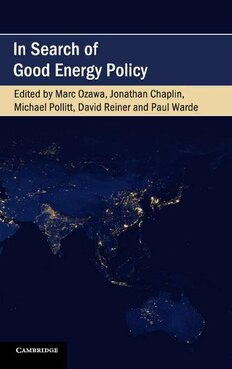
In Search of Good Energy Policy PDF
Preview In Search of Good Energy Policy
in search of good energy policy Drawing on political science, economics, philosophy, theology, social anthropology, history, management studies, law, and other subject areas, In Search of Good Energy Policybringstogetherleadingacademicsfromacrossthesocialsciencesandhumanities toofferaninnovativelookatwhyscienceandtechnology,andthetypeofquantification they champion, cannot alone meet the needs of energy policy making in the future. Featuringworld-classresearchersfromtheUniversityofCambridgeandotherleading universitiesaroundtheworld,thisinnovativebookpresentsaninterdisciplinarydialogue in which scientists and practitioners reach across institutional divides to offer their perspectivesontherelevanceofmulti-disciplinaryresearchfor‘realworld’application. Thisworkshouldbereadbyanyoneinterestedinunderstandinghowmultidisciplinary researchandcollaborationisessentialtocraftinggoodenergypolicy. MarcOzawaisanassociatedresearcheroftheEnergyPolicyResearchGroup(EPRG)at theUniversityofCambridge.Hiscurrentresearchexaminestheroleoftrustininterna- tional relations, NATO-Russian relations and Russian, East European and Eurasian affairs. JonathanChaplinisaspecialistinpoliticaltheologyandamemberofthe‘InSearchof “Good” Energy’ Project. He was Director of the Kirby Laing Institute for Christian Ethics,basedinCambridge,from2006to2017.Currentlyanindependentscholar,he is a member of the Divinity Faculty of Cambridge University, a Senior Fellow of the Canadianthink-tankCardusandaconsultantresearcherfortheLondon-basedreligion andsocietythink-tankTheos. Michael Pollitt is Professor of Business Economics at the Cambridge Judge Business School in the University of Cambridge and a Fellow of Sidney Sussex College, Cambridge. He is chair of the ‘In Search of ‘Good’ Energy Policy’ Grand Challenge initiativeofEnergy@CambridgeandanAssistantDirectoroftheEnergyPolicyResearch Group(EPRG). DavidReinerisSeniorLecturerattheCambridgeJudgeBusinessSchoolandAssistant Director of the Energy Policy Research Group at Cambridge University. His research focusesonenergyandclimatechangepolitics,policy,economics,regulationandpublic attitudes,withaparticularfocusonsociallicensetooperate. Paul Warde is a Reader in Environmental History at the University of Cambridge, previously having been Professor of Environmental History at the University of East Anglia. His previous publications include The Invention of Sustainability: Nature and destiny,1500–1870(2018);TheEnvironment:AHistoryoftheIdea(2018);andPowertothe People:EnergyinEuropeOvertheLastFiveCenturies(2013). In Search of Good Energy Policy Editedby MARC OZAWA CambridgeUniversityEnergyPolicyResearchGroup JONATHAN CHAPLIN CambridgeUniversityFacultyofDivinity MICHAEL POLLITT CambridgeUniversityJudgeBusinessSchool DAVID REINER CambridgeUniversityJudgeBusinessSchool PAUL WARDE CambridgeUniversityFacultyofHistory UniversityPrintingHouse,Cambridgecb28bs,UnitedKingdom OneLibertyPlaza,20thFloor,NewYork,ny10006,USA 477WilliamstownRoad,PortMelbourne,vic3207,Australia 314–321,3rdFloor,Plot3,SplendorForum,JasolaDistrictCentre, NewDelhi–110025,India 79AnsonRoad,#06–04/06,Singapore079906 CambridgeUniversityPressispartoftheUniversityofCambridge. ItfurtherstheUniversity’smissionbydisseminatingknowledgeinthepursuitof education,learning,andresearchatthehighestinternationallevelsofexcellence. www.cambridge.org Informationonthistitle:www.cambridge.org/9781108481168 doi:10.1017/9781108639439 ©MarcOzawa,JonathanChaplin,MichaelPollitt,DavidReinerandPaulWarde2019 Thispublicationisincopyright.Subjecttostatutoryexception andtotheprovisionsofrelevantcollectivelicensingagreements noreproductionofanypartmaytakeplacewithoutthewritten permissionofCambridgeUniversityPress. Firstpublished2019 PrintedintheUnitedKingdombyTJInternationalLtd.PadstowCornwall AcataloguerecordforthispublicationisavailablefromtheBritishLibrary. isbn978-1-108-48116-8Hardback isbn978-1-108-45546-6Paperback CambridgeUniversityPresshasnoresponsibilityforthepersistenceoraccuracyof URLsforexternalorthird-partyinternetwebsitesreferredtointhispublication anddoesnotguaranteethatanycontentonsuchwebsitesis,orwillremain, accurateorappropriate. Contents ListofFigures pagexiii ListofTables xv ListofContributors xvi Acknowledgments xxix 1 Introduction 1 MarcOzawa,JonathanChaplin,MichaelPollitt,DavidReiner, andPaulWarde 1.1 WhyDoWeNeedaMultidisciplinarySocialScience–and Humanities–BasedApproachtoEnergyPolicy? 4 1.2 MultidisciplinaryApproachestoEnergyPolicy 7 1.3 ExamplesofDifferentDisciplinaryApproachesin SocialSciencesandHumanities 9 1.4 BookStructure 10 1.5 HighlightsandKeyLessons 11 part i multidisciplinary perspectives 23 2 PoliticalScienceandEnergy 25 DavidM.Reiner 2.1 Introduction 25 2.2 EnergyandthePoliticalScienceLiterature 26 2.3 EnergyandPoliticalSubfields 27 2.4 AreasofFutureGrowth:PuttingEnergyintoEnvironmental andClimatePolitics 29 2.5 References 31 vi Contents 3 Economics–TheProperValuationofSecurityandEnvironment 32 DavidNewbery 3.1 Introduction 32 3.2 TheRoleandLimitationsofCompetitiveMarkets 33 3.3 MarketCompletenessandMissingMarkets 35 3.4 ClimateChangeMitigation 37 3.5 Security 41 3.6 Conclusions 42 3.7 References 42 4 GoodEnergy:PhilosophicalPerspectives 45 TimLewens 4.1 GoodOutcomesandGoodProcesses 45 4.2 GoodOutcomes 46 4.2.1 EnergyJustice 46 4.2.2 FutureGenerations 47 4.2.3 Non-identity 47 4.2.4 ComparingConsequences 48 4.3 GoodProcesses 49 4.3.1 TheRoleofExperts 49 4.3.2 InductiveRisk 50 4.3.3 Participation 52 4.3.4 Precaution 54 4.4 Conclusions:Science,PolicyandProcess 56 5 PublicTheology–‘Grounded’:AnEnergyPolicyRootedin HumanFlourishing 57 JonathanChaplin 5.1 TheNatureof‘PublicTheology’ 57 5.2 EnvironmentalPublicTheology 58 5.3 PublicTheologyand‘Good’EnergyPolicy 64 5.4 Conclusions:FromTheologytoAction 66 5.5 References 67 6 AnthropologyandEnergyPolicy 69 CharlotteJohnson 6.1 Interests 69 6.1.1 AnthropologyoftheState 70 6.1.2 EconomicAnthropology 70 6.1.3 MaterialCultureoftheHomeandConsumption 71 6.1.4 DigitalAnthropology 72 6.2 Approaches 72 6.3 Collaborations 73 6.4 References 74 Contents vii 7 History:ALongView? 76 PaulWarde 8 Management–FromtheDrawingBoardtoSuccessfulDelivery 82 JimPlatts 8.1 EmbodyingWisdom 83 8.2 DevelopinganIndustry 84 8.3 DevelopingNewInfrastructure 85 8.4 InsightfulLeadershipIdentifiestheRisksandRemovesThem 85 8.5 DevelopingBiggerWindTurbines 86 8.6 MakingItHappen 87 9 LegalAspectsofEnergyPolicy 89 TibisayMorgandiandJorgeE.Vin˜uales 9.1 Introduction 89 9.2 ExtractionofShaleGasintheEuropeanUnion 90 9.3 Low-CarbonPoliciesintheUnitedStates 93 9.4 RenewableEnergySupportinIndia 95 9.5 LegalAspectsof‘Good’EnergyPolicy 96 part ii cases and multidisciplinary responses 99 10 TheEthicsofNuclearEnergy:ItsPast,PresentandFuture 101 BehnamTaebiandSabineRoeser 10.1 Introduction 101 10.2 TheEthicsofNuclearEnergy:WhereWeComeFrom 103 10.3 NewNuclearTechnology:OldandNewChallenges 104 10.4 MultinationalNuclearWasteDisposalandProblemsofJustice 106 10.5 TheNeedforGlobalGovernanceofNuclearEnergy 108 10.6 NuclearRisk,ValuesandEmotions 109 10.7 Conclusions 112 10.8 References 113 10.9 Responseto‘TheEthicsofNuclearEnergy–ItsPast, PresentandFuture’ 116 AlexandraC.H.Skelton 10.9.1 References 119 11 FukushimaandGermanEnergyPolicy2005–2015/2016 120 ChristianGrowitschandFelixHo¨ffler 11.1 TheImmediateEffectofFukushima 120 11.1.1 ThePoliticalConsequences 120 11.1.2 Short-TermMarketandQuantityReactions 121 viii Contents 11.2 Long-TermEffectsoftheAcceleratedPhase-Out 127 11.3 SomeTentativeInterpretations 132 11.4 Responseto‘FukushimaandGermanEnergyPolicy 2005–2015/2016’ 136 MarcOzawa 12 RethinkingtheEnvironmentalState:AnEconomicHistory oftheSwedishEnvironmentalKuznetsCurveforCarbon 139 MagnusLindmark 12.1 Introduction 139 12.2 TheOilCrisesandtheDevelopmentofCarbonEmissions 140 12.3 WhytheOilIntensityWasSoHighin1973 144 12.4 TheRoleofTaxesandSubsidies 147 12.5 Energyandthe‘ThirdWay’EconomicPolicy 149 12.6 FromThreeMileIslandtotheCarbonCeilingandBeyond 153 12.7 Conclusions 156 12.8 References 158 12.8.1 OfficialPublications 158 12.8.2 OnlineResources 159 12.8.3 NewspaperArticles 159 12.8.4 Literature 159 12.9 Responseto‘RethinkingtheEnvironmentalState:AnEconomic HistoryoftheSwedishEnvironmentalKuznetsCurveforCarbon’ 162 MichaelG.Pollitt 12.9.1 References 164 13 FossilFuelSystemsto100PerCentRenewableEnergy-BasedSmart EnergySystems:LessonsfromtheCaseofDenmark,1973–2017 165 FredeHvelplund,SørenDjørupandKarlSperling 13.1 Introduction 165 13.2 TheSocialAnthropologicalGOINGCLOSEApproach 168 13.3 WhatCanWeLearnfromthe1975–2017HistoryoftheDanish EnergySector? 169 13.3.1 From1975to2001 169 13.3.2 From2001to2017 170 13.4 TheDevelopmentandImplementationofIntegratedSmart EnergySystems 172 13.4.1 TheSmartEnergySystemScenario 172 13.4.2 TheTransmissionSystemScenario 173 13.5 TheOwnershipDiscussionandtheTransitiontoSmartEnergy Systems 173 13.6 TheCoordinationofSmartEnergySystemsversusthe CoordinationoftheTransmissionLineParadigm 176 Contents ix 13.6.1 WillSmartEnergySystemsBeAbletoPoliticallyand EconomicallyCompetewiththeTransmissionLine ParadigmunderthePresentInstitutionalRegime? 176 13.6.2 IftheConditionsforSmartEnergySystemsImprove, WillTheseSystemsBeConsumer-or Municipality-Owned? 178 13.7 PolicySuggestions 179 13.8 Conclusions 180 13.9 CommentsonDanishHeatingPoliciessince1950: ASocialSciencePerspectiveonDanishHeatSystems 184 PaulWarde 14 ThePoliticsofCarbonCaptureandStorage:HowInterestsHave OutstrippedEconomicsinShapingtheEvolutionofaTechnology 187 DavidM.Reiner 14.1 Introduction 187 14.2 APre-HistoryofCCS:TheAnalysts’(andStakeholder?) Favourite 189 14.3 ABriefGoldenEraofCCS(2003–2009) 192 14.4 MovingbeyondRhetoricalSupport(2009–):AMoreSceptical ViewofInterests 194 14.4.1 Government 194 14.4.2 EnergyIndustry 195 14.4.3 NGOs 196 14.5 Conclusions:WhyHavethePoliticsofCCSBeenSoDifficult? 197 14.6 Responseto‘ThePoliticsofCarbonCaptureandStorage: HowInterestsHaveOutstrippedEconomicsinShapingthe EvolutionofaTechnology’ 200 JimPlatts 15 ScalingCleanEnergyforDataCentres:Trends,Problems,Solutions 202 AtifAnsar,DanMadrigalandSethCollins 15.1 Introduction 202 15.2 EnergyUseinDataCentres 204 15.2.1 Utilisation 204 15.2.2 Virtualisation 205 15.3 FacilityTypesandEnergyConsequences 205 15.4 MetricsandMeasurement 205 15.5 TwinSolutions:EnergyEfficiencyandRenewableGeneration 207 15.5.1 TheCaseforEfficiency 207 15.5.2 EfficiencyGainsinCoolingTechnologies 207 15.5.3 PUEInnovation 208 15.5.4 TheCaseforRenewablePowerinDataCentres 209
